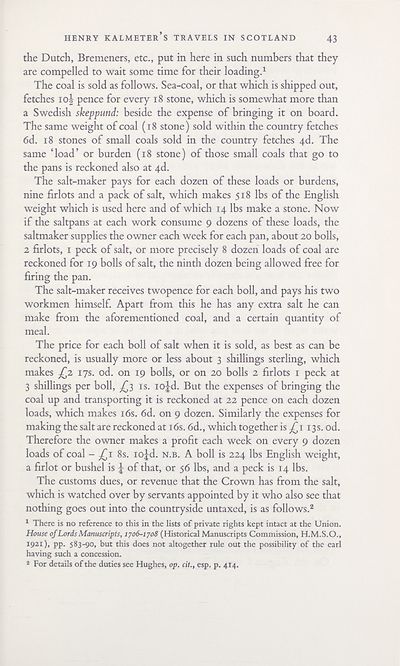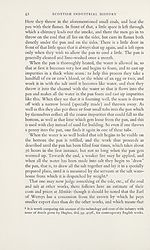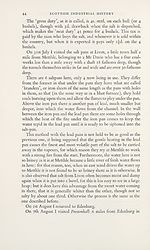Series 4 > Scottish industrial history
(88) Page 43
Download files
Complete book:
Individual page:
Thumbnail gallery: Grid view | List view

HENRY KALMETEr’s TRAVELS IN SCOTLAND 43
the Dutch, Bremeners, etc., put in here in such numbers that they
are compelled to wait some time for their loading.1
The coal is sold as follows. Sea-coal, or that which is shipped out,
fetches 10J pence for every 18 stone, which is somewhat more than
a Swedish skeppund: beside the expense of bringing it on board.
The same weight of coal (18 stone) sold within the country fetches
6d. 18 stones of small coals sold in the country fetches 4d. The
same Toad’ or burden (18 stone) of those small coals that go to
the pans is reckoned also at 4d.
The salt-maker pays for each dozen of these loads or burdens,
nine firlots and a pack of salt, which makes 518 lbs of the English
weight which is used here and of which 14 lbs make a stone. Now
if the saltpans at each work consume 9 dozens of these loads, the
saltmaker supplies the owner each week for each pan, about 20 bolls,
2 firlots, 1 peck of salt, or more precisely 8 dozen loads of coal are
reckoned for 19 bolls of salt, the ninth dozen being allowed free for
firing the pan.
The salt-maker receives twopence for each boll, and pays his two
workmen himself. Apart from this he has any extra salt he can
make from the aforementioned coal, and a certain quantity of
meal.
The price for each boll of salt when it is sold, as best as can be
reckoned, is usually more or less about 3 shillings sterling, which
makes £2 17s. od. on 19 bolls, or on 20 bolls 2 firlots 1 peck at
3 shillings per boll, £3 is. lojd. But the expenses of bringing the
coal up and transporting it is reckoned at 22 pence on each dozen
loads, which makes 16s. 6d. on 9 dozen. Similarly the expenses for
making the salt are reckoned at 16s. 6d., which together is ^1 13 s. od.
Therefore the owner makes a profit each week on every 9 dozen
loads of coal - £1 8s. lojd. n.b. A boll is 224 lbs English weight,
a firlot or bushel is J of that, or 56 lbs, and a peck is 14 lbs.
The customs dues, or revenue that the Crown has from the salt,
which is watched over by servants appointed by it who also see that
nothing goes out into the countryside untaxed, is as follows.2
1 There is no reference to this in the lists of private rights kept intact at the Union.
House of Lords Manuscripts, 1706-1708 (Historical Manuscripts Commission, H.M.S.O.,
1921), pp. 583-90, but this does not altogether rule out the possibility of the earl
having such a concession.
2 For details of the duties see Hughes, op. cit., esp. p. 414.
the Dutch, Bremeners, etc., put in here in such numbers that they
are compelled to wait some time for their loading.1
The coal is sold as follows. Sea-coal, or that which is shipped out,
fetches 10J pence for every 18 stone, which is somewhat more than
a Swedish skeppund: beside the expense of bringing it on board.
The same weight of coal (18 stone) sold within the country fetches
6d. 18 stones of small coals sold in the country fetches 4d. The
same Toad’ or burden (18 stone) of those small coals that go to
the pans is reckoned also at 4d.
The salt-maker pays for each dozen of these loads or burdens,
nine firlots and a pack of salt, which makes 518 lbs of the English
weight which is used here and of which 14 lbs make a stone. Now
if the saltpans at each work consume 9 dozens of these loads, the
saltmaker supplies the owner each week for each pan, about 20 bolls,
2 firlots, 1 peck of salt, or more precisely 8 dozen loads of coal are
reckoned for 19 bolls of salt, the ninth dozen being allowed free for
firing the pan.
The salt-maker receives twopence for each boll, and pays his two
workmen himself. Apart from this he has any extra salt he can
make from the aforementioned coal, and a certain quantity of
meal.
The price for each boll of salt when it is sold, as best as can be
reckoned, is usually more or less about 3 shillings sterling, which
makes £2 17s. od. on 19 bolls, or on 20 bolls 2 firlots 1 peck at
3 shillings per boll, £3 is. lojd. But the expenses of bringing the
coal up and transporting it is reckoned at 22 pence on each dozen
loads, which makes 16s. 6d. on 9 dozen. Similarly the expenses for
making the salt are reckoned at 16s. 6d., which together is ^1 13 s. od.
Therefore the owner makes a profit each week on every 9 dozen
loads of coal - £1 8s. lojd. n.b. A boll is 224 lbs English weight,
a firlot or bushel is J of that, or 56 lbs, and a peck is 14 lbs.
The customs dues, or revenue that the Crown has from the salt,
which is watched over by servants appointed by it who also see that
nothing goes out into the countryside untaxed, is as follows.2
1 There is no reference to this in the lists of private rights kept intact at the Union.
House of Lords Manuscripts, 1706-1708 (Historical Manuscripts Commission, H.M.S.O.,
1921), pp. 583-90, but this does not altogether rule out the possibility of the earl
having such a concession.
2 For details of the duties see Hughes, op. cit., esp. p. 414.
Set display mode to:
![]() Universal Viewer |
Universal Viewer | ![]() Mirador |
Large image | Transcription
Mirador |
Large image | Transcription
Images and transcriptions on this page, including medium image downloads, may be used under the Creative Commons Attribution 4.0 International Licence unless otherwise stated. ![]()
| Scottish History Society volumes > Series 4 > Scottish industrial history > (88) Page 43 |
|---|
| Permanent URL | https://digital.nls.uk/126656067 |
|---|
| Description | Over 180 volumes, published by the Scottish History Society, containing original sources on Scotland's history and people. With a wide range of subjects, the books collectively cover all periods from the 12th to 20th centuries, and reflect changing trends in Scottish history. Sources are accompanied by scholarly interpretation, references and bibliographies. Volumes are usually published annually, and more digitised volumes will be added as they become available. |
|---|


